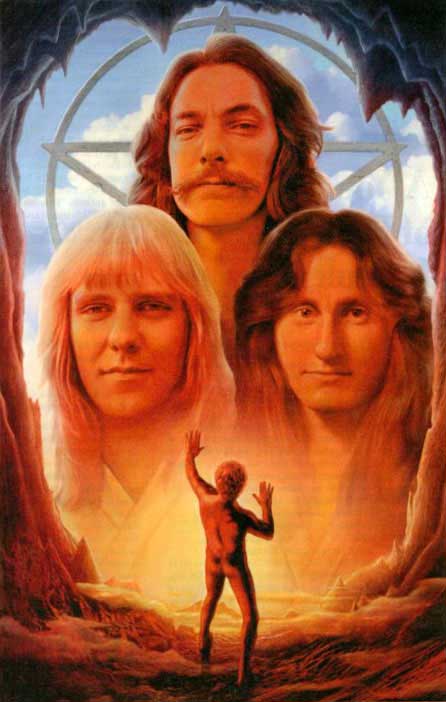When Rush Rocked Out In Space
(2112 Deluxe Edition Album Review)
The new Rock Hall of Famers were never better or more Rush-like than on this '76 epic
By Rob Sheffield, illustration by Tim O'Brien, Rolling Stone, January 2 (online)/January 17 (print) 2013

Rush
2112: Deluve Edition
Four Stars out of Five
Rush have always been one of rock's all-time great argument starters. Anywhere North American males gather, it's possible to ignite a fierce debate just by name-dropping these Canadian prog sages. You can quibble over Geddy Lee's voice or Alex Lifeson's guitar chops. You can dissect how drummer-librettist Neil Peart's philosophy has changed drastically over the years. You can question the way they malign wolves in the "Dionysus: Bringer of Love" section of "Cygnus X-I: Book II" from Hemispheres.
But most of all, you can always start an argument over 2112, the 1976 rock opera that made them stars. Rush made more-popular records, more-succinct records, but 2112 - newly reissued in expanded form - is their most extreme, grandiose and Rush-like record, and thus their greatest - the definitive 20 minutes and 34 seconds of the Rush worldview (plus five extra songs on Side Two, which nobody has ever played twice).
It might have made sense to reissue 2112 a year ago, so everyone could drunkenly download it on New Year's Eve. But that would have been obvious and predictable, which isn't Rush's style. That's why on their 2012 tour, with their popularity at an all-time peak, they chose to highlight their Eighties synth-pop phase, which Rush fans regard the way Zeppelin fans regard Jimmy Page's Death Wish II soundtrack. Rush like to keep people mystified.
The deluxe version of 2112 features remastered music (although, philosophically speaking, not mastered at all). It adds three live tracks and a digital comic-book version of the story, which goes like this: In the futuristic society of Megadon, where music is outlawed, a kid finds an old guitar. He figures out how to play it, which makes him a criminal to the evil priests from the Temples of Syrinx. Can his innocent strums revive the ancient spirit of music? Can he escape the tyranny of the elders? Will they let him rock? (Spoiler alert: Noooo!)
Although Peart was still in his long-since-abandoned Ayn Rand phase, 2112 has really nothing to do with the New York speed-freak author. Instead, it has an authentically grubby dork compassion. 2112 doesn't try to emulate the lame upscale respectability of other rock operas. The abrasively distinctive sonics, from Peart's busy tempo shifts to Lee's squawk of doom, keep it from ever fading into the background. Nobody will ever turn it into a Broadway show.
It's built to be played loud on headphones, late at night, all alone, staring at the wall and wondering when your life is going to stop feeling like imprisonment in the towers of Megadon. What are Rush but a three-headed "It Gets Better" statement for generations of messed-up adolescents, dreaming of a better world but unwilling to give up on this one?
So what will people argue about now that Rush have been voted into the Rock and Roll Hall of Fame? Don't worry - Rush fans can just move on to debating why their heroes are deprived of knighthoods or the Nobel Prize in economics. Rush fans love to argue. And Rush obviously like it that way.